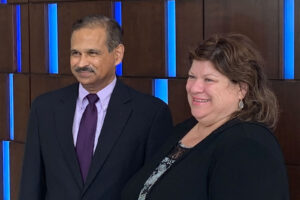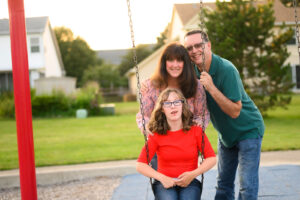Like many of us during this challenging time, I have a lot of time on my hands. I have used that time to reorder, purge and clean every nook of my home. Last week, I reached an area of my home I jokingly called “the twilight zone,” a closet that held items from nearly every dimension of my life.
Nestled in the farthest corner, almost completely out of sight, was something I had forgotten about for years—a small, round, decades-old candy box. Inside the box were small pieces of lined paper. Each one was almost illegible but contained a world of memories, like when I received a cat. Others were sadder.
It struck me while I read that my memories were so important to me that I needed to keep them safely hidden from the world. That box contained moments of my life which held meaning and revealed my most vulnerable self. Sealing this part of myself off from the world protected my fragility.
As an adult, my candy box is no longer the guardian of my most private self. Instead, I am. I have a well-constructed wall around my heart. The wall is invisible, silent and portable. Unfortunately, it also shuts me off from experiencing real depth within my life.
I associated sharing my deepest feelings with weakness, and I translated intimate connection to mean a risk of rejection. To avoid these experiences, I opted for the safety of my own gated heart. As a result, I became emotionally vacant. I wanted more from my life. In order to experience a life of depth, I had to break free from my own internal prison.
As a child, I learned that vulnerability could leave you open for attack. I grew up in a world that over-glorified brute force as a solution and said feelings were toxic. Strength came from removing emotion and emotional attachments were a sign of weakness.
Our value and sense of self-worth is often subject to the opinions of those around us. Experiencing rejection or shame as a result of emotional vulnerability teaches us that it is safer to keep our real feelings locked away. While this approach makes us feel accepted, it also locks us out of the life we should be living. Being our true selves is not a risk; it is a gift. Our experiences and feelings shape us, piece by piece, into the whole person we are meant to be. Embracing our vulnerability creates self-acceptance, healing, growth and an ability to help others around us.
We become teachers for others when we share our vulnerabilities and self-acceptance. We prove that strength comes from within. Our guidance helps others realize they are not alone. How many times have you felt comforted by someone else’s story? Each time we break down a wall hiding who we really are, we transmute inner blocks into personal power.
Keeping our most intimate selves locked away in “candy boxes” cuts us off from experiencing real intimacy and connection with others, and mostly with ourselves. Hiding the most honest form of ourselves cuts off our greatest gift to the world: the person we truly are. Once you accept yourself as you are, no outside opinion holds value over yours.
Use this simple exercise (download here) to break down your inner walls and turn your vulnerabilities into strengths or follow along below. On a sheet of paper, write about a single experience that affected you profoundly. Next, write and answer the following questions:
- What was your strongest feeling?
- What did you need to learn from this experience?
- What can you teach someone else from this experience?
- Who are you now because of this experience?







